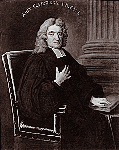John Flamsteed
|
 |
born Aug. 19, 1646, Denby, near Derby, Derbyshire, England
died Dec. 31, 1719, Greenwich, London
founder of the Greenwich Observatory, and the first astronomer royal of England.
Poor health forced Flamsteed to leave school in 1662. He studied astronomy on his own and later (1670–74) continued his education at the University of Cambridge. In 1677 he became a member of the Royal Society. Ordained a clergyman in 1675, Flamsteed in 1684 received the income of the living of Burstow, Surrey. His report to the Royal Society on the need for a new observatory resulted in the founding (1675) of the Royal Greenwich Observatory, of which he was the first director (and hence astronomer royal). He found that he himself had to supply all the instruments at Greenwich, apart from a few gifts; he was forced to take private pupils to augment his income. A small inheritance from his father, who died in 1688, provided the means to construct a mural arc, a wall-mounted instrument for measuring the altitudes of stars as they passed the meridian.
The latter part of Flamsteed's life passed in controversy over the publication of his excellent stellar observations. He struggled to withhold them until completed, but they were urgently needed by Isaac Newton and Edmond Halley, among others. Newton, through the Royal Society, led the movement for their immediate publication. In 1704 Prince George of Denmark undertook the cost of publication, and, despite the prince's death in 1708 and Flamsteed's objections, the incomplete observations were edited by Halley, and 400 copies were printed in 1712. Flamsteed later managed to burn 300 of them. His own star catalog, Historia Coelestis Britannica (1725), listed more stars (3,000) and gave their positions much more accurately than did any other previous work. Some stars, such as 61 Cygni, are still known by their numbers in his system.
Copyright © 1994-2002 Encyclopædia Britannica, Inc.
![]()
Sources
- Encylopedia Britannica 2002, Expanded Edition DVD
Web





